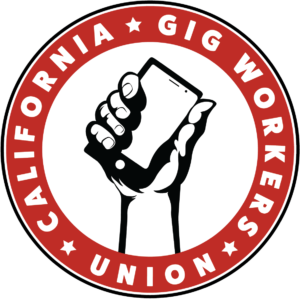SoCal Rideshare and Delivery Driver Survey:
The Impact of Soaring Gas Prices,
March 18, 2022 – April 28, 2022
Summary
An overwhelming majority of 658 Southern California rideshare and delivery drivers surveyed from March 18 to April 28 report that the recent surge in gas prices has cut substantially into their earnings. And a large preponderance of the drivers — who work for companies like Uber, Lyft, DoorDash, Instacart, Amazon, and other tech giants — also say that because of increased fuel costs they have struggled to afford basic expenses, such as rent, utilities, and food.
A substantial majority of the gig drivers surveyed also believe that the companies they work for should pay them more because gas prices have increased.
Fuel costs have surged across the nation. At many stations across the LA area, gas prices are above $6 per gallon. Because gig drivers are misclassified as “independent contractors” by the companies they work for, these workers largely cover the cost of fuel on their own with little or no support from Silicon Valley gig giants.
This survey was fielded and analyzed by Mobile Workers Alliance using a random sample of gig drivers in Southern California, most of whom drive in the greater Los Angeles area. The poll was conducted through texting a survey link to cell phones with surveys in both English and Spanish.
Roughly 64% of drivers surveyed report that they work for Uber, while 59% say they work for Lyft, 26% work for Uber Eats, 21% work for DoorDash. Less than 15% work for other companies like Amazon Flex (6%), Grubhub (9%), Instacart (11%), and Postmates (12%).
85% of SoCal gig drivers surveyed say gas prices have reduced their earnings by “a lot.”
Overwhelmingly, gig drivers surveyed (85%) say increased gas prices have reduced their earnings by “a lot.” Many fewer say higher gas prices have reduced their earnings somewhat (11%), while even less say not by much (1%), or not at all (2%).
Has the recent increase in gas prices reduced your earnings as a gig or delivery worker?
| Yes, by a lot | 85%* |
| Yes, somewhat | 11% |
| Not by much | 1% |
| No | 2% |
*Percentages equal 99% because of rounding.
90% of SoCal gig drivers surveyed say they have had difficulties paying basic expenses because of rising gas prices.
A large majority (90%) of gig workers report that they have struggled to pay basic expenses (rent, utilities, food, etc.) because their earnings have been reduced by high gas prices. Most of these drivers say they are struggling to pay rent/housing costs (82%), utilities (60%), and food (59%).
Have you had difficulties paying basic expenses or bills (rent, utilities, food, etc.) because your earnings as a rideshare or delivery driver have been reduced by rising gas prices?
| Yes | 90% |
| No | 10% |
What bills or expenses are you struggling to afford because of reduced earnings due to high gas prices (select all that apply)? (602 responses)
| Rent/Housing | 82% |
| Utilities | 60% |
| Food | 59% |
| Child Care | 8% |
| Medical Expenses | 23% |
| Other | 19% |
98% of SoCal gig drivers surveyed believe the companies they work for should pay them more because gas prices have increased.
Do you think the company(ies) you work for should pay you more because gas prices have increased? (633 responses)
| Yes | 98% |
| No | 2% |
62% of drivers report paying $201 or more on gas per week.
How much are you spending on gas per week?
| $150-$200 | 39%* |
| $201-$250 | 22% |
| $251-$300 | 14% |
| $301-$350 | 9% |
| $350 or more | 17% |
*Percentages equal 101% because of rounding.
Background: Gig companies like Uber and Lyft spent more than $225 million in 2020 campaigning for Proposition 22 — a voter measure that passed in November of that year that allows gig companies to misclassify gig drivers as “independent contractors” and not employees of the tech giants.
In August 2021, an Alameda County Superior Court judge ruled that Prop 22 was unconstitutional under state law, as it limits California lawmakers’ power to include gig workers in the state’s workers’ compensation program and was not limited to a single subject because it strips the legislature of its ability to pass laws protecting drivers’ right to organize and form a union. The ruling also said that gig companies misled voters about the intent of Prop 22.
Still, gig drivers’ conditions haven’t changed much as the companies appeal the decision.
Amazon Flex drivers take shifts through an app much like rideshare drivers, picking up packages at Amazon warehouses and other facilities to deliver to customers.
As independent contractors, rideshare and Amazon Flex drivers largely cover the cost of fuel on their own with little support from the tech companies they work for. These workers’ misclassification as “independent contractors” also excludes them from basic labor rights and protections — including paid sick leave, overtime pay, unemployment insurance, access to workers’ compensation, and the right to form a union.
Mobile Workers Alliance is part of a coalition of over 24,000 drivers statewide who are responsible for the billions that companies like Uber and their investors pocket every year. We’re uniting to win our union and a better life for ourselves and our loved ones.
###
